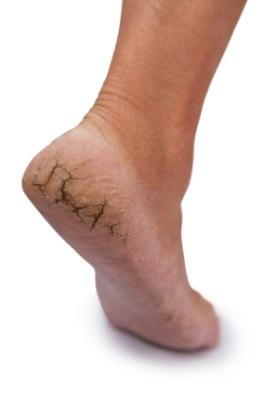 Cracked heels are also be known as heel fissures. They are usually caused by excessively dry skin. While cracked heels are often a purely cosmetic problem, they can become quite painful if the cracks are deep. In rare cases, the cracks may be deep and severely painful, can bleed, and can raise the risk of an infection. But even small cracks on the heels can allow tiny fungi or viruses to get in and infect the skin of the feet, causing athlete’s foot or plantar warts to develop. If you have cracked heels, home treatment methods, such as soaking the feet in warm water, exfoliating the heels with a pumice stone, and applying a thick moisturizer, can be a great help. However, if your cracked heels are deep, painful, or showing signs of infection, or if you have diabetes, it is suggested that you see a podiatrist for treatment.
Cracked heels are also be known as heel fissures. They are usually caused by excessively dry skin. While cracked heels are often a purely cosmetic problem, they can become quite painful if the cracks are deep. In rare cases, the cracks may be deep and severely painful, can bleed, and can raise the risk of an infection. But even small cracks on the heels can allow tiny fungi or viruses to get in and infect the skin of the feet, causing athlete’s foot or plantar warts to develop. If you have cracked heels, home treatment methods, such as soaking the feet in warm water, exfoliating the heels with a pumice stone, and applying a thick moisturizer, can be a great help. However, if your cracked heels are deep, painful, or showing signs of infection, or if you have diabetes, it is suggested that you see a podiatrist for treatment.
Cracked heels are unsightly and can cause further damage to your shoes and feet. If you have any concerns, contact one of our podiatrists of The Foot and Ankle Associates of North Carolina, PLLC. Our doctors can provide the care you need to keep you pain-free and on your feet.
Cracked Heels
Cracked heels appear unappealing and can make it harder for you walk around in sandals. Aside from looking unpleasant, cracked heels can also tear stockings, socks, and wear out your shoes. There are several methods to help restore a cracked heel and prevent further damage.
How Do You Get Them?
Dry skin is the number one culprit in creating cracked heels. Many athletes, walkers, joggers, and even swimmers suffer from cracked heels. Age and skin oil production play a role to getting cracked heels as well.
Promote Healing
Over the counter medicines can help, especially for those that need instant relief or who suffer from chronic dry feet.
Wear Socks – Wearing socks with medicated creams helps lock in moisture.
Moisturizers – Applying both day and night will help alleviate dryness which causes cracking.
Pumice Stones – These exfoliate and remove dead skin, which allows for smoother moisturizer application and better absorption into the skin.
Change in Diet
Eating healthy with a well-balanced diet will give the skin a fresh and radiant look. Your body responds to the kinds of food you ingest. Omega-3 fatty acids and zinc supplements can also revitalize skin tissue.
Most importantly, seek professional help if unsure how to proceed in treating cracked heels. A podiatrist will help you with any questions or information needed.
If you have any questions, please feel free to contact one of our offices located in Ahoskie, Durham, Raleigh, and Rocky Mount, NC. We offer the newest diagnostic and treatment technologies for all your foot care needs.

